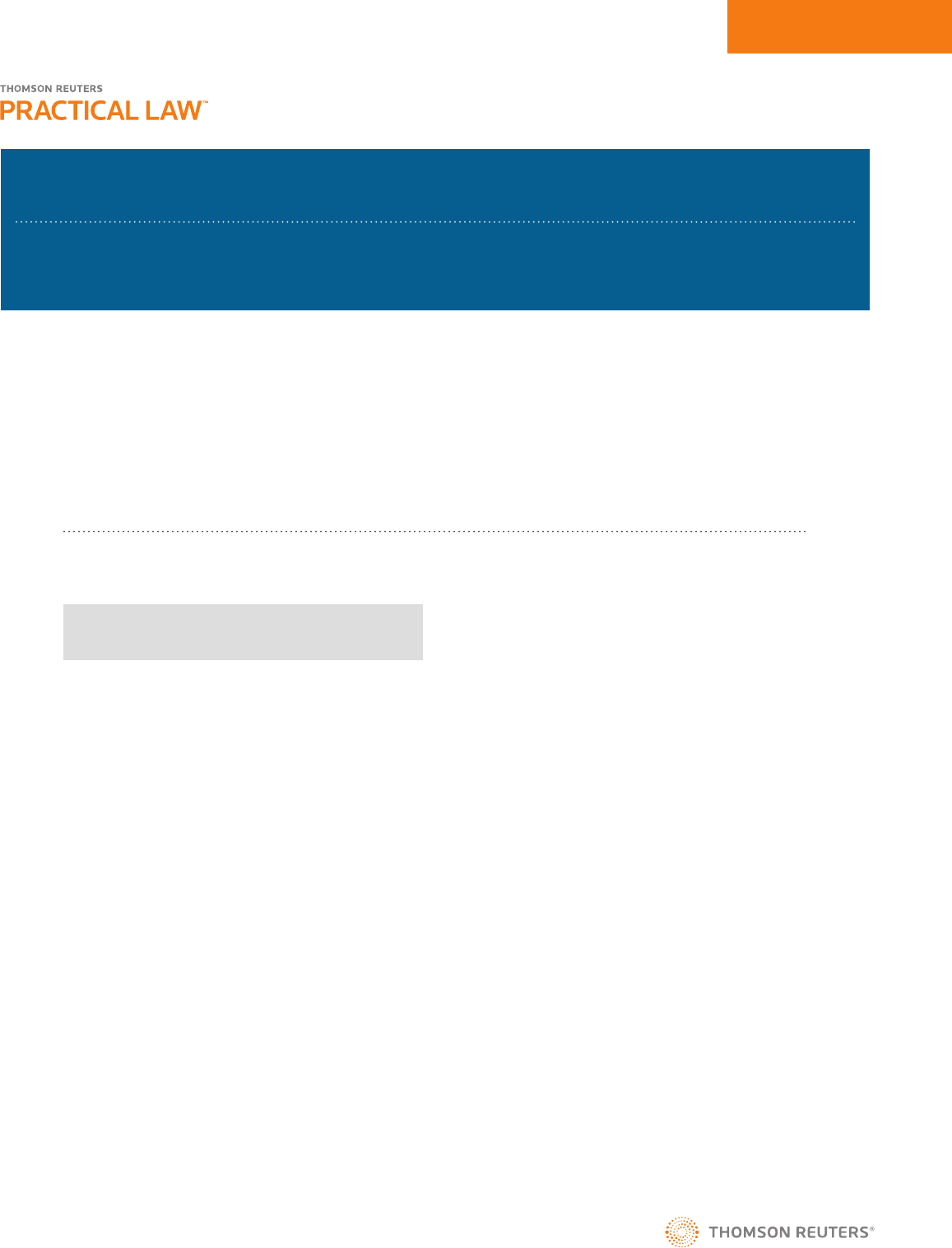
STATE Q&A
© 2020 Thomson Reuters. All rights reserved. Use of Practical Law websites and services is subject to the Terms of Use
(static.legalsolutions.thomsonreuters.com/static/agreement/westlaw-additional-terms.pdf) and Privacy Policy (a.next.westlaw.com/Privacy).
Contract Basics for Litigators: Texas
by Evan A. Moeller and Aaron G. McLeod, Adams and Reese LLP, with Practical Law Commercial Litigation
Status: Law stated as of 19 Oct 2020 | Jurisdiction: Texas, United States
This document is published by Practical Law and can be found at: us.practicallaw.tr.com/w-025-4730
Request a free trial and demonstration at: us.practicallaw.tr.com/about/freetrial
A Q&A guide to state law on contract principles and breach of contract issues under Texas common
law. This guide addresses contract formation, types of contracts, general contract construction
rules, how to alter and terminate contracts, and how courts interpret and enforce dispute resolution
clauses. This guide also addresses the basics of a breach of contract action, including the elements
of the claim, the statute of limitations, common defenses, and the types of remedies available to the
non-breaching party.
Contract Formation
1. What are the elements of a valid contract
in your jurisdiction?
In Texas, the elements of a valid contract are:
• An offer.
• Acceptance in strict compliance with the terms of the
offer.
• Consideration.
• Mutual assent (meeting of the minds) regarding
material terms.
• Execution and delivery of the contract with the intent
that it be mutual and binding.
(Baylor Univ.v.Sonnichsen, 221 S.W.3d 632, 635 (Tex.
2007); Arshadv.Am. Express Bank, FSB, 580 S.W.3d
798, 804 (Tex. App.—Houston [14th Dist.] 2019, no
pet.); 2001 Trinity Fund, LLCv.Carrizo Oil & Gas, Inc.,
393S.W.3d 442, 449 (Tex. App.—Houston [14th Dist.]
2012, pet. denied).)
Offer
Under Texas law, an offer is a statement or conduct
that shows with reasonable certainty an intent by the
offeror to enter into a binding agreement with the
offeree (Tauchv.Angel, Trustee for Gobsmack Gift Tr.,
580S.W.3d 808, 813 (Tex. App.—Houston [14th Dist.] 2019,
pet.denied); Principal Life Ins. Co.v.Revalen Dev., LLC,
358S.W.3d 451, 455 (Tex. App.—Dallas 2012, pet. denied)).
To prove a valid offer, a party must show that:
• The offeror intended to make an offer. The offeror’s
conduct and language must show with reasonable
certainty an intent to enter a binding contract with the
offeree. An invitation to engage in negotiations does not
show an intent to make an offer.
• The terms of the offer were clear and definite. The
offeree cannot accept an offer to form a contract unless
the terms of the offer are reasonably certain (Fort Worth
Indep. Sch. Dist.v.City of Fort Worth, 22 S.W.3d 831, 846
(Tex. 2000) (no contract existed where the agreement
to share revenue lacked essential terms regarding the
percentage of revenue the plaintiff receives); Engelman
Irrigation Dist.v.Shields Bros., Inc., 960 S.W.2d 343, 352
(Tex. App.—Corpus Christi 1997, pet. denied).)
• The offeror communicated the essential terms of the
offer to the offeree.
(Tauch, 580 S.W.3d at 814; Domingov.Mitchell, 257
S.W.3d 34, 39 (Tex. App.—Amarillo 2008, pet. denied).)
An offer may be revoked at any time before acceptance
(Tauch, 580 S.W.3d at 815). Revocation is effective either
when it is communicated directly to the offeree or when the
offeree receives notice of the offeror’s intention to revoke
(Kidwillv.Werner, 2006 WL 3627883, at *1 (Tex. App.—Waco
Dec. 13, 2006, no pet.) (mem. op.); Valenciav.Garza, 765
S.W.2d 893, 896 (Tex. App.—San Antonio 1989, no writ)).

2 Practical Law
© 2020 Thomson Reuters. All rights reserved. Use of Practical Law websites and services is subject to the Terms of Use
(static.legalsolutions.thomsonreuters.com/static/agreement/westlaw-additional-terms.pdf) and Privacy Policy (a.next.westlaw.com/Privacy).
Contract Basics for Litigators: Texas
• A benefit to the promisor.
• A loss or detriment to the promisee.
(Ulico Cas. Co.v.Allied Pilots Ass’n, 262 S.W.3d 773, 790-91
(Tex. 2008) (the detriment must induce the making of
the promise and the promise must induce the incurring
of a detriment); TLC Hospitality, LLCv.Pillar Income Asset
Mgmt., Inc., 570 S.W.3d 749, 760-61 (Tex. App.—Tyler
2018, pet. denied) (obligations must be imposed on both
parties at the inception of the contract or else the contract
lacks consideration).)
Consideration must be sufficient. A single consideration
is sufficient to support multiple bargained-for promises
in a single contract (Birdwellv.Birdwell, 819 S.W.2d 223,
228 (Tex. App.—Fort Worth 1991, writ denied)). Past
consideration or a promise to fulfill a pre-existing duty is
not sufficient consideration (Alex Sheshunoff Mgmt. Servs.,
L.P.v.Johnson, 209 S.W.3d 644, 659 (Tex. 2006) (Jefferson,
C.J., concurring)). Consideration is presumed sufficient
to support a contract when the contract is in writing and
signed by the parties to be charged (McLernonv.Dynegy,
Inc., 347 S.W.3d 315, 335 (Tex. App.—Houston [14th Dist.]
2011, no pet.)).
Lack of consideration is an affirmative defense to a contract
that must be pleaded and proved by the defendant
(Roarkv.Stallworth Oil & Gas, Inc., 813 S.W.2d 492, 495
(Tex. 1991); TLC Hospitality, LLC, 570 S.W.3d at 761).
Mutual Assent
Under Texas law, the creation of a binding contract
requires mutual assent or a “meeting of the minds”
regarding the essential terms of the contract (David J.
Sacks, P.C.v.Haden, 266 S.W.3d 447, 450 (Tex. 2008)).
This is an objective determination based on the parties’
actions and statements, not on their subjective state of
mind. It requires both parties to understand and agree to
the subject matter and essential terms of their agreement.
(City of The Colonyv.N. Tex. Mun. Water Dist., 272 S.W.3d
699, 720 (Tex. App.—Fort Worth 2008, pet. dism’d).)
The essential terms of a contract must be agreed on
before a party can enforce the contract. Terms are
essential and material if the parties would reasonably
regard them as a vital element of the bargain (Barrow-
Shaver Res. Co.v.Carrizo Oil & Gas, Inc., 590 S.W.3d
471, 481-82 (Tex. 2019).) A contract is unenforceable if
the essential terms are uncertain or omitted (Shipleyv.
Vasquez, 534 S.W.3d 482, 487 (Tex. App.—San Antonio
2017, pet. denied); Meruv.Huerta, 136 S.W.3d 383, 391
(Tex. App.—Corpus Christi 2004, no pet.) (agreement
Acceptance
Under Texas law, to prove a valid acceptance of an offer, a
party must show:
• The acceptance was made before the offer lapsed or
was revoked by the offeror (Advantage Physical Therapy,
Inc.v.Cruse, 165 S.W.3d 21, 25-26 (Tex. App—Houston
[14th Dist.] 2005, no pet.)).
• The offeree accepts the offer:
– in a manner that strictly complies with the offer’s terms
(if the offer requires a specific manner of acceptance); or
– in a reasonable way from the overall circumstances if
the offer does not specify the manner of acceptance.
• The acceptance was communicated to the offeror.
• The acceptance was clear and definite.
(Tecore, Inc.v.AirWalk Comms., 418 S.W.3d 374, 385
(Tex. App.—Dallas 2013, pet. denied); Angelouv.African
Overseas Union, 33 S.W.3d 269, 278-79 (Tex. App.—
Houston [14th Dist.] 2000, no pet.); Engelman Irrigation
Dist., 960 S.W.2d at 352; Valencia, 765 S.W.2d at 896-97.)
If an acceptance is made via mail, it is made when notice
of the acceptance is physically transmitted to the offeror,
such as dropping it into a mailbox (the mailbox rule) (Am.
Heritage Life Ins.v.Koch, 721 S.W.2d 611, 613 (Tex. App.—
Tyler 1986, writ ref’d n.r.e.) (this rule does not apply if the
offer stipulates that the acceptance must be received
before the contract is completed)). The mailbox rule may
not apply if the offeror requires that certain conditions
be met for acceptance (Cantuv.Cent. Educ. Agency, 884
S.W.2d 565, 566-67 (Tex. App.—Austin 1994, no writ)
(where offeror made no requirements on how offer should
be accepted, offer was accepted once acceptance was
dropped in the mail).)
The acceptance must be identical to the offer to make a
binding contract (GasMark, Ltd.v.Kimball Energy Corp.,
868 S.W.2d 925, 928 (Tex. App.—Fort Worth 1994, no
writ)). An acceptance that does not mirror the material
terms of the offer is both a rejection of the original offer
and a counteroffer (Principal Life Ins. Co., 358 S.W.3d at
455 (parties must agree to the same thing, in the same
sense, at the same time)).
Consideration
Under Texas law, a contract must be based on
consideration (sometimes called mutuality of obligation).
Consideration is the bargained for exchange of promises
and consists of either:

3 Practical Law
© 2020 Thomson Reuters. All rights reserved. Use of Practical Law websites and services is subject to the Terms of Use
(static.legalsolutions.thomsonreuters.com/static/agreement/westlaw-additional-terms.pdf) and Privacy Policy (a.next.westlaw.com/Privacy).
Contract Basics for Litigators: Texas
to enter into negotiations in the future is unenforceable
because there is no way to determine what contract
the negotiations may produce)). Essential terms are
determined on a case-by-case basis (Fischerv.CTMI,
L.L.C., 479 S.W.3d 231, 237 (Tex. 2016)).
Mutual assent may be either:
• Expressly stated in the contract (an express contract).
• Inferred from the circumstances (an implied-in-fact
contract).
(BoRain Capital, LLCv.Hashmi, 533 S.W.3d 32, 36
(Tex.App.—San Antonio 2017, pet. denied).)
Delivery and Execution with Intent to
BeBound
Under Texas law, the parties form a binding contract by
delivering it to the appropriate party. Delivery occurs
when the party parts with possession or custody of an
instrument with the intent that it become operative
(Scaifev.Associated Air Ctr. Inc.,100 F.3d 406, 410-11
(5thCir. 1996) (applying Texas law) (no contract was
formed where the contract was never delivered or signed
by the parties and work under the contract never began);
Mid-Continent Cas. Co.v.Global Enercom Mgmt. Inc., 323
S.W.3d 151, 157 (Tex. 2010).)
However, a contract need not be signed and delivered if
the contract does not require it and the parties show intent
by their conduct to be bound (Baylor Univ.v.Sonnichsen,
221 S.W.3d 632, 635 (Tex. 2007) (no mutual assent to form
a contract where university never delivered signed draft of
employment contract to plaintiff)).
2. What categories of contracts must be in
writing to satisfy your jurisdiction’s statute
of frauds?
Under Texas law, the statute of frauds requires certain
types of contracts to be in writing and signed by the person
(or an authorized agent) against whom enforcement is
sought (Tex. Bus. & Com. Code Ann.§26.01(a)). The types
of contracts required to be in writing include:
• A promise by an executor or administrator to answer out
of the person’s own estate for any debt or damage due
from the person’s testator or intestate (Tex. Bus. & Com.
Code Ann.§26.01(b)(1)).
• A promise to pay the debt, default, or miscarriage of
another person (an oral suretyship) (Tex. Bus. & Com.
Code Ann.§26.01(b)(2)).
• An agreement made on consideration of marriage or
on consideration of nonmarital conjugal cohabitation
(Tex.Bus. & Com. Code Ann.§26.01(b)(3)).
• A contract for the sale of real estate (Tex. Bus. & Com.
Code Ann.§26.01(b)(4)).
• A real estate lease for a term longer than one year
(Tex.Bus. & Com. Code Ann.§26.01(b)(5)).
• Any agreement that cannot be performed within one
year from the date the agreement was made (Tex.
Bus.& Com. Code Ann.§26.01(b)(6)).
• A promise or agreement to pay a commission for the
sale or purchase of:
– an oil or gas mining lease;
– an oil or gas royalty;
– minerals; or
– a mineral interest.
(Tex. Bus. & Com. Code Ann.§26.01(b)(7)(A)-(D).)
• An agreement, promise, contract, or warranty of cure
relating to medical care or results thereof made by a
physician or health care provider as defined in Texas
Civil Practice and Remedies Code Ann.§74.001, but not
pharmacists (Tex. Bus. & Com. Code Ann.§26.01(b)(8)).
• A loan agreement for an amount more than $50,000 as
defined by Texas Business and Commerce Code§26.02(b)
(Tex. Bus. & Com. Code Ann.§26.02(a)(1)).
• A contract for the sale of goods valued at $500 or
more with certain exceptions (Tex. Bus. & Com. Code
Ann.§2.201(a)).
3. In your jurisdiction, what must the writing
contain to satisfy the statute of frauds?
Under Texas law, a writing satisfies the statute of frauds
if it:
• Contains all the essential elements of the agreement.
Terms are essential if the parties:
– reasonably regard the terms as vitally important to
the elements of the bargain; and
– intended them to be essential.
(Burrusv.Reyes, 516 S.W.3d 170, 186-87 (Tex. App.—El Paso
2017, pet. denied) (because the law implies a reasonable
time for performance, time for performance is not an
essential term); see also Kananv.Plantation Homeowner’s
Ass’n, Inc., 407 S.W.3d 320, 330 (Tex. App.—Corpus Christi
2013, no pet.) (to be enforceable, a contract must define

4 Practical Law
© 2020 Thomson Reuters. All rights reserved. Use of Practical Law websites and services is subject to the Terms of Use
(static.legalsolutions.thomsonreuters.com/static/agreement/westlaw-additional-terms.pdf) and Privacy Policy (a.next.westlaw.com/Privacy).
Contract Basics for Litigators: Texas
essential elements with sufficient detail so a court can
determine the obligations of the parties).)
• Is complete within itself in every material detail.
• Can be ascertained from the writing without having to
resort to oral testimony or parol evidence.
• Demonstrates an intent by the parties to be bound by
the contract.
• Is signed by the party to be charged.
(Capano Energy, LLC, 593 S.W.3d at 729-30 (emails
between a landowner and energy company regarding
payment for easement did not satisfy the statute of frauds
where the emails did not contain all of the essential
elements of the contract); Hartford Fire Ins. Co.v.C. Springs
300, Ltd., 287 S.W.3d 771, 778-79 (Tex. App.—Houston [1st
Dist.] 2009, pet. denied) (writing that contemplated future
contract or promise does not satisfy statute of frauds);
Swinehartv.Stubbeman, McRae, Sealy, Laughlin & Browder,
Inc., 48 S.W.3d 865, 877 (Tex. App.—Houston [14th Dist.]
2001, pet. denied) (essential elements of a contract may
never be supplied by parol evidence, but details which
explain or clarify essential terms may be proven by parol
evidence).)
Partial performance is an exception to the statute of
frauds and may take a contract out of the statute (Burrus,
516 S.W.3d at 182-85; Thomasv.Miller, 500 S.W.3d 601,
609 (Tex. App.—Texarkana 2016, no pet.)).
Types of Contracts
4. Describe the types of contracts your
jurisdiction recognizes. Please include how
your jurisdiction defines each type.
Texas law recognizes the following types of contracts:
• Express.
• Implied-in-fact.
• Quasi-Contract, or implied-in-law.
• Unilateral and Bilateral.
Express Contract
A contract is express when its terms have been explicitly
set out by the parties. The parties’ mutual agreement to be
bound by the contract is expressly stated in the contract,
rather than by the parties’ conduct (E-Learning LLCv.AT&T
Corp., 517 S.W.3d 849, 858 (Tex. App.—San Antonio 2017,
no pet.); Wal-Mart Stores, Inc.v.Lopez, 93 S.W.3d 548, 557
(Tex. App.—Houston [14th Dist.] 2002, no pet.).)
Implied-in-Fact Contract
An implied-in-fact contract is based on inferences
from the facts and circumstances of the case. The
court implies mutual assent from the parties’ acts and
conduct (McAllen Hosps., L.P.v.Lopez, 576 S.W.3d 389,
392 (Tex. 2019) (implied-in-fact contract not established
between hospital and nurses for annual salary where
there was no evidence hospital intended to be bound
by the agreement); Wal-Mart Stores, Inc., 93 S.W.3d at
557-58 (meeting of the minds is an essential element of
an implied contract and is evidenced from conduct and
course of dealing)).
Quasi-Contract
A quasi-contract, also called an implied-in-law contract,
is a legal fiction imposed regardless of any actual
agreement between the parties (Walkerv.Cotter Props.,
Inc., 181 S.W.3d 895, 900 (Tex. App.—Dallas, 2006, no
pet.) (recovery of damages is appropriate to prevent a
party from obtaining a benefit from another by fraud,
duress, unjust enrichment, or undue advantage)). A
quasi-contract imposes an obligation between two
parties in the interest of justice even though it is clear
that no promise was ever intended or made. A party
generally cannot recover under the theory of a quasi-
contract when a valid, express contract exists that covers
the subject matter of the parties’ dispute. (Fortune
Prod. Co.v.Conoco, Inc., 52 S.W.3d 671, 684 (Tex. 2000)
(recovery under an equitable theory is inconsistent with
the existence of a valid contract).)
A plaintiff asserting breach of a quasi-contract typically
seeks restitution under quantum meruit or unjust
enrichment (Burlington N. R.R. Co. v.Sw. Elec. Power Co.,
925 S.W.2d 92, 97 (Tex. App.—Texarkana, 1996) aff’d
966 S.W.2d 467 (Tex. 1998) (law implies a contractual
obligation on the defendant to restore benefits to the
plaintiff where the defendant has been unjustly enriched
in a matter not governed by a contract); Houston Med.
Testing Servs., Inc.v.Mintzer, 417 S.W.3d 691, 698 (Tex.
App.—Houston [14th Dist.] 2013, no pet.) (law imposes
an obligation in the interest of justice even though no
promise was made or intended and there was no meeting
of the minds)).

5 Practical Law
© 2020 Thomson Reuters. All rights reserved. Use of Practical Law websites and services is subject to the Terms of Use
(static.legalsolutions.thomsonreuters.com/static/agreement/westlaw-additional-terms.pdf) and Privacy Policy (a.next.westlaw.com/Privacy).
Contract Basics for Litigators: Texas
Unilateral and Bilateral Contracts
A bilateral contract exists when:
• There are mutual promises between two parties,
making each both a promisor and a promisee
(Vanegasv.Am. Energy Servs., 302 S.W.3d 299, 302
(Tex. 2009)).
• Each promise is sufficient consideration for the other
(Frequent Flyer Depot, Inc. v. Am. Airlines, Inc., 281 S.W.3d
215, 224 (Tex. App.—Fort Worth 2009, pet. denied)
(there must be mutuality of obligation which may consist
of benefits or detriments to the contracting parties)).
A unilateral contract exists when a promisor promises a
benefit if a promisee performs (City of Pearsallv.Tobias,
533 S.W.3d 516, 522 (Tex. App.—San Antonio, 2017, pet.
denied)). Consideration for a unilateral contract exists not
by an exchange of promises but by a promise exchanged
for performance. Once a promisee performs, a unilateral
contract becomes enforceable. (City of Houstonv.Williams,
353 S.W.3d 128, 135 (Tex. 2011); Vanegas, 302 S.W.3d at
302 (unilateral contract existed where company’s promise
to pay at-will employees five percent of sale proceeds
if employees remained employed until sale of company
was finalized was a promise made in exchange for
performance).)
Construction of Contracts
5. What are the general rules of contract
construction in your jurisdiction? For
example, rules construing inconsistencies,
intention of the parties, definitions, etc.
Intention of the Parties
Under Texas law, courts attempt to ascertain the parties’
intentions based solely on the words used in the contract,
viewing the entire writing as a whole (Barrow-Shaver
Res. Co.v.Carrizo Oil & Gas, Inc., 590 S.W.3d 471, 479
(Tex.2019); J.M. Davidson, Inc.v.Webster, 128 S.W.3d
223,229 (Tex. 2003)).
Grammar and Meanings
Under Texas law, courts interpret the language that the
parties use in a contract by its ordinary meaning unless
it clearly appears that doing so defeats their intentions.
Words, terms, or phrases that have specialized meanings
in a certain industry or field are treated as terms of art
and given the specialized meaning they are understood to
have. (Barrow-Shaver Res. Co., 590 S.W.3d at 479; Plains
Expl & Prod. Co.v.Torch Energy Advisors Inc., 473 S.W.3d
296, 305 (Tex. 2015) (courts interpret contracts from a
“utilitarian” standpoint, interpreting language in the
context of the business activity sought to be served by the
agreement); Heritage Res., Inc.v.NationsBank, 939 S.W.2d
118, 121-22 (Tex. 1996).)
Implied Terms
Texas courts highly disfavor implied contract terms. Texas
courts find a contract contains implied provisions only
when the court believes that such provisions are legally
necessary to further the intentions of the parties. (HECI
Expl Co.v.Neel, 982 S.W.2d 881, 888-89 (Tex. 1998)
(courts cannot make contracts for the parties); Sharon
Ibrahm, Inc.v.Houston-Galveston Area Local Dev. Corp.,
582 S.W.3d 753, 771 (Tex. App.—Houston [1st Dist.] 2019,
no pet.) (in order to imply a term into an agreement, it
must appear that it was so necessary to the contract that
the parties inadvertently left it out and it is essential to the
contract as a whole).)
Entire Contract
Under Texas law, a court examines the entire contract and
attempts to harmonize all of its provisions, even if some
parts appear to be contradictory or inconsistent (Anadarko
Petroleum Corp.v.Thompson, 94 S.W.3d 550, 554 (Tex.
2002)). Each clause of a contract is considered in the context
of the instrument as a whole (Plains Expl & Prod. Co.v.Torch
Energy Advisors Inc., 473 S.W.3d 296, 305 (Tex. 2015)).
Ambiguity or Inconsistency
A contractual term is ambiguous if either:
• Its meaning is uncertain or doubtful.
• It is subject to two or more reasonable interpretations
after applying the applicable rules of contract
construction.
(Italian Cowboy Partners, Ltd.v.Prudential Ins. Co. of
Am., 341 S.W.3d 323, 333 (Tex. 2011); Marxv.FDP, LP,
474 S.W.3d 368, 375 (Tex. App.—San Antonio 2015,
pet.denied).)
A contractual ambiguity is:
• A patent ambiguity where the ambiguity arises from
imprecise language appearing on the face of a written
contract.
• A latent ambiguity where the ambiguity does not
appear on the face of a contract but becomes apparent

6 Practical Law
© 2020 Thomson Reuters. All rights reserved. Use of Practical Law websites and services is subject to the Terms of Use
(static.legalsolutions.thomsonreuters.com/static/agreement/westlaw-additional-terms.pdf) and Privacy Policy (a.next.westlaw.com/Privacy).
Contract Basics for Litigators: Texas
only when using knowledge gained from a collateral
matter. An example of a latent ambiguity is a contract
for delivery to a green house on Pecan Street when
there are two green houses on Pecan Street. (URI,
Inc.v.Kleberg Cty., 543 S.W.3d 755, 765 (Tex. 2018)).
Ambiguity does not arise merely because the parties
may disagree about the meaning of a contract term (URI,
Inc., 543 S.W.3d at 763). Courts enforce the contract
as written when the contract is unambiguous (First
Bankv.Brumitt, 519 S.W.3d 95, 105 (Tex. 2017); David J.
Sacks, P.C.v.Haden, 266 S.W.3d 447, 450 (Tex. 2008)).
If a contract is ambiguous, courts may consider the
parties’ interpretation and admit extraneous evidence
to determine the true meaning of the agreement
(URI, Inc., 543 S.W.3d at 764-65 (noting that no issue
regarding parties’ intentions is raised unless the contract
is ambiguous); Nat’l Union Fire Ins. Co. of Pittsburgh,
PAv.CBI Indus., Inc., 907 S.W.2d 517, 520 (Tex. 1995)).
Specific Over General
Under Texas law, a contract provision specifically
addressing a particular subject matter controls over a
more general contract provision (Wells Fargo Bank, Minn.,
N.A.v.N. Cent. Plaza I, L.L.P., 194 S.W.3d 723, 726 (Tex.
App.—Dallas 2006, pet. denied)).
6. How does your jurisdiction define and
apply the parol evidence rule?
Under Texas law, the parol-evidence rule:
• Precludes evidence of prior or contemporaneous
agreements that are inconsistent with the contract,
where the contract provides that it is a complete and
accurate integration of the parties’ entire agreement (Boy
Scouts of Am.v.Response Terminal Sys., Inc., 790 S.W.2d
738, 744-45 (Tex. App.—Dallas 1990, pet. denied)).
• Applies only to written contracts (O’Farrill Avilav. Gonzalez,
974 S.W.2d 237, 246 (Tex. App.—San Antonio 1998, pet.
denied)).
• Does not preclude evidence of prior contemporaneous
agreements that are collateral to, not inconsistent with,
and do not vary or contradict the express or implied
terms of the original contract (Westv.Quintanilla, 573
S.W.3d 237, 243 (Tex. 2019); Boy Scouts of Am., 790
S.W.2d at 745 (a collateral agreement is one that the
parties might naturally have made but not ordinarily
have included in the contract)).
• Does not bar evidence of later agreements that are
used to explain or give effect to the contract and are
not inconsistent with, vary, or contradict the terms of
the original contract (Hallmarkv.Port/Cooper-T. Smith
Stevedoring Co., 907 S.W.2d 586, 590 (Tex. App.—
Corpus Christi 1995, no writ)).
When applying the parol evidence rule, a court must first
determine if the contract is a valid integrated contract.
Courts presume that a contract is integrated if it is in
writing, executed, and includes the final expression of
terms. The parol evidence rule is particularly applicable
when the contract recites that it contains the entire
agreement of the parties, or contains similar merger
provisions (Adamsv.McFadden, 296 S.W.3d 743, 752
(Tex. App.—El Paso 2009, pet. denied) (parol evidence
rule presumes all prior negotiations and agreements have
been merged into the written contract).)
If a contract is deemed unambiguous, parol evidence will
not be received for the purpose of creating an ambiguity
or to give a contract a meaning different from its plain
language (Charles R. Tips Family Tr.v.PB Comm. LLC,
459 S.W.3d 147, 153 (Tex. App.—Houston [1st Dist.] 2015,
no pet.)).
If a contract is found to be ambiguous, parol evidence
may be admitted to resolve the ambiguity (Charles R. Tips
Family Tr., 459 S.W.3d at 153). Courts may consider parol
evidence of the facts and circumstances surrounding
a contract’s execution as an aid in understanding the
language of the contract, but only to the extent the
extrinsic evidence does not add to, alter, or contradict the
contract’s text (URI, Inc.v.Kleberg Cty., 543 S.W.3d at 765).
Altering and Terminating Contracts
7. Describe how a party modifies a contract
in your jurisdiction.
Under Texas law, the parties to the contract may modify it
by either:
• A writing executed by the contracting parties.
• An oral agreement if:
– the written contract does not preclude oral
modifications; and
– it is not a contract required by the statute of frauds or
other Texas statute to be in writing.
• A course of performance that shows a meeting of the
minds to modify the contract.
(Pointe W. Ctr., LLCv.It’s Alive, Inc., 476 S.W.3d 141, 151
(Tex. App.—Houston [1st Dist.] 2015, no pet.) (Texas courts

7 Practical Law
© 2020 Thomson Reuters. All rights reserved. Use of Practical Law websites and services is subject to the Terms of Use
(static.legalsolutions.thomsonreuters.com/static/agreement/westlaw-additional-terms.pdf) and Privacy Policy (a.next.westlaw.com/Privacy).
Contract Basics for Litigators: Texas
consider a written bargain or agreement to be of no
higher legal degree than an oral one, as either may vary
or discharge the other); Am. Garment Props., Inc.v.CB
Richard Ellis-El Paso, L.L.C., 155 S.W.3d 431, 435 (Tex.
App.—El Paso 2004, no pet.).)
A modification must include all the essential of a contract,
including new consideration supporting the modification
(Pointe W. Ctr., 476 S.W.3d at 152.)
8. Does your jurisdiction recognize
novations? If so, how does your jurisdiction
define them and how are they executed?
Texas law recognizes novations. The elements of a
novation are:
• A valid existing contract.
• A mutual agreement of all parties to make a new contract.
• The extinguishment of the old contract.
• A valid new contract.
(In re B.N.L.-B, 523 S.W.3d 254, 263-64 (Tex. App.—Dallas
2017, pet. denied); Vandeventerv.All Am. Life & Cas. Co.,
101 S.W.3d 703, 712 (Tex. App.—Fort Worth 2003, no pet.)
(novation also includes the substitution of a party to the
same agreement).)
A court looks to the intentions of the parties to determine
if a novation has occurred. A party cannot create a
novation unilaterally (Vandeventer, 101 S.W.3d at 712).
Novation is an affirmative defense to a claim for
breach of contract (Fulcrum Ctrl.v.AutoTester, Inc.,
102S.W.3d 274, 277 (Tex. App.—Dallas, 2003, no pet.);
Honeycuttv.Billingsley, 992 S.W.2d 570, 576 (Tex.
App.—Houston [1st Dist.] 1999, pet. denied)).
9. Describe how a party terminates a
contract in your jurisdiction.
Under Texas law, contracts typically terminate after all
contractual obligations are satisfied or on a date or under
conditions specified in the contract. Absent fraud, courts
generally enforce contracts that provide for termination
or that provide for cancellation without penalty. If the
contract does not have a termination provision, the law
imposes a reasonable time standard. (Cmty. Health Sys.
Prof. Servs. Corp.v.Hansen, 525 S.W.3d 671, 681 (Tex.
2017) (employment contract as written can only be
cancelled for cause during years one through three and
without cause under specified conditions for year four
and five); Tiger Truck, LLCv.Bruce’s Pulp & Paper, LLC, 282
S.W.3d 176, 183-84 (Tex. App.—Beaumont, 2009, no pet.);
Driver Pipeline Co.v.Mustang Pipeline Co., Inc., 69 S.W.3d
779, 787-88 (Tex. App.—Texarkana 2002), rev’d on other
grounds, 134 S.W.3d 195 (Tex. 2004).)
A party may also terminate a contract when:
• The other party commits a material breach or
repudiates the contract.
• The party has complied with contractual provisions
governing termination.
(Bartush-Schnitzius Foods Co.v.Cimco Refrigeration, Inc.,
518 S.W.3d 432, 436 (Tex. 2017); Guerrov.Santa Rosa
Indep. Sch. Dist., 241 S.W.3d 594, 603-04 (Tex. App.—
Corpus Christi 2007, pet. denied); Driver Pipeline Co., 69
S.W.3d at 787-88.)
Dispute Resolution Clauses
10. How does your jurisdiction interpret and
enforce choice of law provisions?
Under Texas law, choice of law provisions are enforced
where:
• There is a reasonable relationship between the parties
and the chosen state.
• The law of the chosen state is not contrary to a
fundamental policy of Texas.
(Gator Apple, LLCv.Apple Tex. Rests., Inc., 442 S.W.3d
521, 532-33 (Tex. App.—Dallas 2014, pet. denied) (parties
generally cannot choose the law of a forum that has no
relationship to the agreement); State Nat’l Bankv.Academia,
Inc., 802 S.W.2d 282, 289 (Tex. App.—Corpus Christi 1990,
writ denied).)
A Texas court may not disregard a choice-of-law
clause, however, merely because the law of the chosen
forum leads to a different result than Texas law
(DeSantisv.Wackenhut Corp., 793 S.W.2d 670, 677-81
(Tex. 1990) (applying Texas law in breach of non-compete
agreement claim despite choice of law clause applying
Florida law, where Texas had a materially greater interest
in determining enforceability of agreement and law of
Florida was contrary to fundamental policies of Texas
government non-compete law)).
Texas courts apply these principles using the framework of
the Restatement (Second) of Conflict of Laws§187 (1971)
(DeSantis, 793 S.W.2d at 677-78.)

8 Practical Law
© 2020 Thomson Reuters. All rights reserved. Use of Practical Law websites and services is subject to the Terms of Use
(static.legalsolutions.thomsonreuters.com/static/agreement/westlaw-additional-terms.pdf) and Privacy Policy (a.next.westlaw.com/Privacy).
Contract Basics for Litigators: Texas
For more information on how Texas courts interpret and
enforce choice of law provisions, see Standard Clause,
General Contract Clauses: Choice of Law (TX). For an
overview of choice of law and choice of forum issues, see
Practice Note, Choice of Law and Choice of Forum: Key Issues.
11. How does your jurisdiction interpret and
enforce choice of forum provisions?
Under Texas law, choice of forum provisions may be
either permissive or mandatory. The interpretation and
enforcement of choice of forum provisions depends on
whether the breach of contract claim is pending in Texas
state or federal court.
Texas State Court Analysis
Under Texas law, choice of forum or forum selection
provisions generally are enforced if:
• The parties have contractually consented to submit to
the exclusive jurisdiction of another state.
• The other state recognizes the validity of such provisions.
(Mabon Ltd.v.Afri-Carib Enters., Inc., 29 S.W.3d 291,
296-97 (Tex. App.—Houston [14th Dist.] 2000, no pet.).)
The enforcement of forum selection clauses is mandatory
unless a party shows that either:
• Enforcement is unreasonable and unjust.
• The clause is invalid for reasons such as fraud or
overreaching.
• The enforcement of the clause goes against a strong
public policy.
• The chosen forum is seriously inconvenient for trial.
(In re Nationwide Insurance Company of America, 494
S.W.3d 708, 712 (Tex. 2016) (noting that a forum selection
clause, like other contractual rights, may be waived); In re
Automated Collection Techs., Inc., 156 S.W.3d 557, 559 (Tex.
2004); In re AIU Ins. Co. 148 S.W.3d 109, 115 (Tex. 2004).)
Forum-selection clauses are enforced regarding claims
that sound in tort, where those claims arise out of or relate
to a contract containing a valid forum selection clause.
Forum selection clauses discourage artful pleading of tort
claims in an effort to get around an otherwise binding
choice of forum clause in a contract (Pinto Tech. Ventures,
L.P.v.Sheldon, 526 S.W.3d 428, 437-39 (Tex. 2017).)
For more information on how Texas courts interpret and
enforce forum selection clauses, see Standard Clause,
General Contract Clauses: Choice of Forum (TX).
Texas Federal Court Analysis
Federal courts in Texas apply federal law to determine the
enforceability of forum selection clauses in both diversity and
federal question cases (Alliance Health Grp., LLCv.Bridging
Health Options, LLC, 553 F.3d 397, 399 (5th Cir. 2008);
Haynsworthv.The Corp., 121 F.3d 956, 961-62 (5th Cir. 1997)).
The US Supreme Court has held that courts should
enforce the parties’ contractually valid choice of forum
except in the most unusual cases (Atl. Marine Const. Co.,
Inc.v.U.S. Dist. Court for W. Dist. of Texas, 571 U.S. 49,
66 (2013); see Legal Update, Supreme Court Explains
How to Enforce Selection Clauses). The Fifth Circuit has
generally found forum selection clauses prima facie valid
and enforceable unless the party challenging enforcement
shows that the provision is unreasonable (Kevlin Servs.,
Inc.v.Lexington State Bank, 46 F.3d 13, 15 (5th Cir. 1995);
Mendozav.Microsoft, Inc., 1 F. Supp. 3d 533, 543 (W.D.
Tex. 2014)). A forum selection clause is unreasonable if:
• The inclusion of the clause was the result of fraud or
overreaching.
• The party opposing the clause essentially loses its
day in court because of the grave inconvenience or
unfairness of the selected forum.
• The chosen law is so fundamentally unfair that it
deprives the plaintiff of a remedy.
• The enforcement of the clause goes against a strong
public policy.
(Haynsworth, 121 F.3d at 963.)
12. How does your jurisdiction interpret
and enforce alternative dispute resolution
provisions, such as mediation and
arbitration clauses?
Under Texas law, courts enforce arbitration agreements
as a matter of policy. A party seeking to enforce an
arbitration clause must show:
• There is a valid arbitration agreement, as determined by
contract law principles.
• The claims at issue fall within the agreement’s scope.
(In re Dillard Dep’t Stores, Inc., 186 S.W.3d 514, 515 (Tex.
2006); Tex. Civ. Prac. & Rem. Code Ann.§171.001-171.098
(Texas Arbitration Act recognizes the validity of written
arbitration agreements regarding controversies that
exist at the time of the agreement or that arise after the
agreement).)

9 Practical Law
© 2020 Thomson Reuters. All rights reserved. Use of Practical Law websites and services is subject to the Terms of Use
(static.legalsolutions.thomsonreuters.com/static/agreement/westlaw-additional-terms.pdf) and Privacy Policy (a.next.westlaw.com/Privacy).
Contract Basics for Litigators: Texas
The threshold questions of whether the parties have
agreed to arbitrate or whether a dispute is covered by
an arbitration agreement are issues to be resolved by
courts, unless the parties have clearly and unmistakably
agreed to submit questions of arbitrability to an
arbitrator (Weitzelv.Coon, 2019 WL 3418515, *2 (Tex.
App.—Houston [1st Dist.] July 30, 2019, no pet.) (mem.
op.) (question of arbitrability must be submitted to
arbitrator where parties had incorporated rules of
American Arbitration Association into contract and those
rules give an arbitrator power to decide these issues);
Longoriav.CKR Prop. Mgmt., LLC, 577 S.W.3d 263,
267 (Tex. App.—Houston [14th Dist.] 2018, pet. denied)
(arbitration agreements are generally valid absent
fraud, duress, unconscionability, revocation, or similar
grounds)).
Any doubts concerning the scope of arbitrable issues
should be resolved in favor of arbitration, whether the
problem at hand is the construction of the contract
language itself, an allegation of waiver or delay, or a
similar defense to arbitrability (Longoria, 577 S.W.3d at
268-69; Millerv.Brewer, 118 S.W.3d 896, 898 (Tex. App.—
Amarillo 2003, no pet.)).
For more information on Alternative Dispute Resolution
in Texas, see Standard Clause, General Contract Clauses:
Alternative Dispute Resolution (Multi-Tiered)(TX); Toolkit,
Drafting Contractual Dispute Provisions (TX): Alternative
Dispute Resolution Resources.
Breach of Contract
13. What are the elements of a breach of
contract claim in your jurisdiction?
Under Texas law, the elements of a breach of contract
claim are:
• The existence of a valid and enforceable contract
between the parties.
• The plaintiff performed, tendered performance of, or
was excused from performing the contract.
• The defendant’s failure to perform the contract.
• The plaintiff’s damages resulting from the breach.
(Pathfinder Oil & Gas, Inc.v.Great W. Drilling, Ltd., 574
S.W.3d 882, 890 (Tex. 2019); S & S Emergency Training
Solutions, Inc.v.Elliot, 564 S.W.3d 843, 847 (Tex. 2018);
E-Learning, LLCv.AT&T Corp., 517 S.W.3d 849, 858 (Tex.
App.—San Antonio 2017, no pet.).)
14. Describe what circumstances are
considered an actionable breach of contract
in your jurisdiction.
Under Texas law, a breach of contract occurs when a party
fails or refuses to do something that a contract obligates
it to do. A breach does not have to be material to be
actionable, but a breach must be material to discharge
the non-breaching party from further performance
obligations. A non-material breach does not excuse the
other party from any obligation to perform, however
the non-breaching party in that circumstance may sue
for damages (Bartush-Schnitzius Foods Co.v.Cimco
Refrigeration, Inc., 518 S.W.3d 432, 436 (Tex. 2017);
Mustang Pipeline Co.v.Driver Pipeline Co., 134 S.W.3d
195, 199-200 (Tex. 2004) (breach of contract requires
finding of a breach, not finding a material breach);
Hernandezv.Gulf Grp. Lloyds, 875 S.W.2d 691, 692-93
(Tex. 1994).)
In determining whether a breach is material, a court
considers whether:
• The breach deprives the injured party of the benefit it
reasonably expected to receive under the contract.
• A breach of contract action can adequately compensate
the plaintiff for the benefit it lost as a result of the
breach.
• The defendant is likely to suffer forfeiture.
• The defendant is likely to cure its breach under all the
circumstances.
• The defendant’s behavior comports with standards of
good faith and fair dealing.
(Bartush-Schnitzius Foods Co., 518 S.W.3d at 436-37;
Mustang Pipeline Co., 134 S.W.3d at 199; Restatement
(Second) of Contracts§241 (1981).)
Some breaches are considered material as a matter of
law, such as a failure to timely perform under a contract
providing that time is of the essence (Mustang Pipeline
Co., 134 S.W.3d at 199-200).
15. What is the statute of limitations
for a breach of contract action in your
jurisdiction? Please also discuss when the
limitations period begins to run, whether
it may be tolled, and how to plead the
defense.

10 Practical Law
© 2020 Thomson Reuters. All rights reserved. Use of Practical Law websites and services is subject to the Terms of Use
(static.legalsolutions.thomsonreuters.com/static/agreement/westlaw-additional-terms.pdf) and Privacy Policy (a.next.westlaw.com/Privacy).
Contract Basics for Litigators: Texas
Under Texas law, the statute of limitations for a breach of
contract claim is four years (Tex. Civ. Prac. & Rem. Code
Ann.§§16.004(1), (3), and 16.051; Tex. Bus. & Com. Code
Ann.§2.725 (providing for four-year statute of limitations
for an action for breach of contract for sale under Texas’s
UCC); Carl M. Archer Tr.v.Tregellas, 566 S.W.3d 281, 288
(Tex. 2018)). Parties may agree to a different limitations
period as part of the underlying contract but cannot agree
to a period of less than two years (Spicewood Summit
Office Condo. Ass’nv.Am. First Lloyd’s Ins., 287 S.W.3d 461,
464-65 (Tex. App.—Austin 2009, pet. denied)).
A breach-of-contract claim accrues at the time of the
actionable breach (Carl M. Archer Tr., 566 S.W.3d at 288).
For actions claiming breach of a continuing contract, the
limitations period begins to run when either:
• The parties complete the work.
• The contract terminates under its terms.
• The defendant anticipatorily repudiates the contract
and the plaintiff adopts the repudiation.
(Capstone Healthcare Equip. Servs.v.Quality Home Health
Care, Inc., 295 S.W.3d 696, 700 (Tex. App.—Dallas 2009,
pet. denied) (injured party has four years from each breach
to bring suit).)
The statute of limitations is an affirmative defense that the
defendant must specifically plead and prove (Tex. R. Civ.
P. 94). A party asserting an affirmative defense in a bench
trial must request findings in support of that defense to
avoid waiver on appeal (Trelltex, Inc.v.Intecx, L.L.C., 494
S.W.3d 781, 785 (Tex. App.—Houston [14th Dist.] 2016,
nopet.).)
Discovery Rule
Under Texas law, the discovery rule tolls the statute of
limitations until the plaintiff knew or should have known
the facts giving rise to the cause of action. The discovery
rule applies where the nature of the plaintiff’s injury is
inherently undiscoverable and the injury is objectively
verifiable (Carl M. Archer Tr., 566 S.W.3d at 290 (objective
of the discovery rule is to avoid an unjust result); B. Mahler
Interests, L.P.v.DMAC Constr., Inc., 503 S.W.3d 43, 59
(Tex. App.—Houston [14th Dist.] 2016, no pet.) (discovery
rule did not apply where plaintiff’s injuries were easily
discoverable); Via Netv.TIG Ins. Co., 211 S.W.3d 310,
315 (Tex. 2006) (noting the discovery rule is limited to
exceptional cases to avoid frustrating the purpose of the
statute of limitations).)
Equitable Estoppel
Under Texas law, equitable estoppel tolls a statute of
limitations where:
• A person with actual or constructive knowledge
of material facts makes a false representation
or concealment of those facts to a party without
knowledge or the means of obtaining knowledge of
the facts.
• The person intends that party to act on it.
• That party relies on the false representation or
concealment of facts to their detriment.
(Wydev.Francesconi, 566 S.W.3d 890, 897 (Tex. App.—
Dallas 2018, no pet.); Kamatv.Prakash, 420 S.W.3d 890,
900 (Tex. App.—Houston [14th Dist.] 2014, no pet.).)
Tolling Statutes
Texas also has statutes that operate to toll the statute of
limitations under certain circumstances. A statute may be
tolled where a party is, for example:
• Under a legal disability, such as where the party is:
– under 18 years of age, regardless of whether the
person is married; or
– of unsound mind.
(Tex. Civ. Prac. & Rem. Code Ann.§16.001; PAK Foods
Houston, LLCv.Garcia, 433 S.W.3d 171, 176 (Tex. App.—
Houston [14th Dist.] 2014, pet. denied) (a party may ratify
a contract once the minor reaches 18 years of age).)
• Prevented from bringing suit by the automatic-
stay provisions of federal bankruptcy law
(11U.S.C.§362(a); Petersonv.Tex. Commerce Bank-
Austin, Nat’l Ass’n, 844 S.W.2d 291, 294 (Tex. App.—
Austin 1992, no writ)).
• Asserting a counterclaim or cross-claim and:
– the counterclaimant or cross-claimant can show
that the counterclaim or cross-claims arise out of the
same transaction or occurrence that is the basis of
the original action; and
– the counterclaimant or cross-claimant files the
counter or cross-claim no later than thirty days after
that party’s answer is due.
(Tex. Civ. Prac. & Rem. Code Ann.§16.069; Ellardv.Ellard,
441 S.W.3d 780, 781-82 (Tex. App.—San Antonio 2014, no
pet.).)

11 Practical Law
© 2020 Thomson Reuters. All rights reserved. Use of Practical Law websites and services is subject to the Terms of Use
(static.legalsolutions.thomsonreuters.com/static/agreement/westlaw-additional-terms.pdf) and Privacy Policy (a.next.westlaw.com/Privacy).
Contract Basics for Litigators: Texas
16. Under what circumstances does your
jurisdiction recognize a third party’s
standing to sue for breach of contract?
Under Texas law, a third party has standing to sue for
breach of contract if the third party can show that:
• It is a donee or creditor beneficiary of the contract.
• Is not benefited only incidentally by the contract’s
performance.
(S. Tex. Water Auth.v.Lomas, 223 S.W.3d 304, 306 (Tex.
2007) (mere description of a product’s intended use
cannot confer third-party-beneficiary status on intended
users of product); Ostrovitz & Gwinn, LLCv.First Specialty
Ins. Co., 393 S.W.3d 379, 388 (Tex. App.—Dallas 2012,
no pet.) (landlord was not a third-party-beneficiary to
insurance contract between insurer and tenant where
insurance policy did not clearly and fully set out an
intention to confer a direct benefit on the landlord)).
A third party is a beneficiary of a contract if:
• The contracting parties intended to secure a benefit for
the third-party.
• The contracting parties made the contract directly for
the third-party’s benefit.
(First Bankv.Brumitt, 519 S.W.3d 95, 102 (Tex. 2017).)
The intention of the contracting parties is controlling.
The contract must show an intent to provide a direct
benefit to the third party and that intention must be
clearly and fully spelled-out. (Ostrovitz, 393 S.W.3d at
388 (it is not enough that the third-party benefits from
the parties’ performance or that the parties knew the
third-party benefits).)
There is a presumption against third-party beneficiary
agreements in Texas (First Bank, 519 S.W.3d at 103).
Courts resolve all doubts against conferring third-party
beneficiary status (Ostrovitz, 393 S.W.3d at 388).
Remedies for Breach of Contract
17. What legal remedies are available to the
non-breaching party in your jurisdiction?
Under Texas law, the prevailing plaintiff in a breach of
contract action typically may recover compensatory
damages, which include:
• General (also called direct) damages.
• Special (also called consequential) damages.
(Dallas/Fort Worth Int’l Airport Bd.v.Vizant Tech., LLC, 576
S.W.3d 362, 373 (Tex. 2019); Arthur Andersen & Co.v.Perry
Equip. Corp., 945 S.W.2d 812, 816 (Tex. 1997).)
Attorney fees are recoverable on a claim for a breach of an
oral or written contract once a party has prevailed on a valid
contract claim (Tex. Civ. Prac. & Rem. Code Ann.§38.001;
MBM Fin. Corp.v.Woodlands Operating Co., L.P., 292 S.W.3d
660, 666 (Tex. 2009); Mustang Pipeline Co., Inc.v.Driver
Pipeline Co., Inc., 134 S.W.3d 195, 201 (Tex. 2004)).
Punitive damages or exemplary damages are not
recoverable in a breach of contract action (Signal Peak
Enters. of Texas, Inc.v.Bettina Invs., Inc., 138 S.W.3d 915,
928 (Tex. App.—Dallas 2004, pet. stricken)). A plaintiff may
recover punitive damages if the defendant breaches a legal
duty separate from the contract in addition to the breach of
the contract (Twin City Fire Ins.v.Davis, 904 S.W.2d 663, 665
(Tex. 1995); Cent. Sav. and Loan Ass’nv.Stemmons Nw. Bank,
N.A., 848 S.W.2d 232, 238 (Tex. App.—Dallas 1992, no writ)).
Compensatory Damages
The purpose of compensatory damages is to restore the
plaintiff to the same position they would have been in had
the defendant not breached the contract. Compensatory
damages include:
• General damages. General (or direct) damages
flow naturally and necessarily from the breach and
compensate for the loss that is conclusively presumed
to have been foreseen or contemplated by the party
as a consequence of the breach of contract (Arthur
Andersen& Co., 945 S.W.2d at 816; Powell Elec. Sys,
Inc.v.Hewlett Packard Co., 356 S.W.3d 113, 118 (Tex.
App.—Houston [1st Dist.] 2011, no pet.)).
• Special damages. Special or consequential damages
result naturally, but not necessarily from the breach of
contract. Plaintiffs may recover consequential damages
only where the damages are foreseeable and directly
traceable to the wrongful act and result from it. The
parties must have contemplated at the time they made
the contract that the damages would be a probable
result of the breach (Stuartv.Bayless, 964 S.W.2d
920, 921 (Tex. 1998); Powell Elec. Sys., Inc., 356 S.W.3d
at 118 (recovery of costs for installation of temporary
transformer during repairs for damages caused by breach
were consequential damages where parties cannot have
conclusively presumed to have foreseen that the breach
necessitates use of a temporary transformer).)
The plaintiff in a breach of contract action may seek
several types of compensatory damages, including:
• Expectancy (or benefit of bargain) damages. Expectancy
or benefit of the bargain damages give the plaintiff the

12 Practical Law
© 2020 Thomson Reuters. All rights reserved. Use of Practical Law websites and services is subject to the Terms of Use
(static.legalsolutions.thomsonreuters.com/static/agreement/westlaw-additional-terms.pdf) and Privacy Policy (a.next.westlaw.com/Privacy).
Contract Basics for Litigators: Texas
benefit of the plaintiff’s bargain by placing it in as good a
position as it can be if the contract had been performed
(Qaddurav.Indo-European Foods, Inc., 141 S.W.3d 882,
888-89 (Tex. App.—Dallas 2004, pet. denied)).
• Reliance damages. Reliance damages restore
any expenditures made in reliance on the contract
(Siamv.Mountain Vista Builders, 544 S.W.3d 504, 515-
16 (Tex. App.—El Paso 2018, no pet.)). These are useful
when a plaintiff’s expectation interest damages, like
lost profits, are too speculative or uncertain (Mistletoe
Express Serv.v.Locke, 762 S.W.2d 637, 638-39 (Tex.
App.—Texarkana 1988, no writ)).
(O’Farrill Avilav.Gonzalez, 974 S.W.2d 237, 247 (Tex.
App.—San Antonio 1998, pet. denied).)
A plaintiff can recover nominal damages even if the plaintiff
cannot prove actual damages (MBM Fin. Corp.v.Woodlands
Operating Co. L.P., 292 S.W.3d 660, 664-65 (Tex. 2009)).
Parties to a contract are free to agree to limit or modify
remedies if a breach occurs (Frost Nat’l Bankv.Heafner,
12 S.W.3d 104, 111 (Tex. App.—Houston [1st Dist.] 1999,
pet. denied) (recovery of benefit of the bargain damages
not allowed where contract excluded recovery of
consequential damages)).
Restitution Damages
A plaintiff can be awarded restitution, which restores to
the plaintiff any property or money taken from the plaintiff
by the defendant, where it is unjust for the defendant to
keep any benefits the defendant has received (City of Harker
Heightsv.Sun Meadows Land, Ltd., 830 S.W.2d 313, 317
(Tex. App.—Austin 1992, no writ)). If the restitution damages
necessarily result from the breach of contract, these damages
are general or direct damages rather than compensatory
damages (Marrs & Smith P’shipv.Sombrero Oil & Gas Co., 511
S.W.3d 53, 59 (Tex. App.—El Paso 2014, no pet.)).
Liquidated Damages
Contracts may contain a liquidated damages clause,
which determines in advance the measure of damages
if a breach occurs. Courts generally enforce liquidated
damages clauses if:
• The harm caused by the breach is incapable of estimation
or is difficult to estimate at the time of the agreement.
• The amount of liquidated damages provided for is a
reasonable forecast of just compensation at the time of
contracting.
(FPL Energy, LLCv.TXU Portfolio Mgmt. Co., 426 S.W.3d
59, 69 (Tex. 2014).)
Courts view evidence concerning the difficulty of estimation
and the reasonableness of the forecast as of the time the
parties executed the contract (FPL Energy, LLC, 426 S.W.3d
at 69-70). A liquidated damages clause is considered a
penalty and unenforceable if either of these elements is
lacking (Arthur’s Garage, Inc.v.Racal-Chubb Sec. Sys., 997
S.W.2d 803, 810 (Tex. App.—Dallas 1999, no pet.)).
For more information on liquidated damages in Texas, see
Standard Clause, General Contract Clauses: Liquidated
Damages (TX).
18. What equitable or other non-legal
remedies are typically available to the non-
breaching party in your jurisdiction?
Under Texas law, if money damages are unavailable or
inadequate to compensate the plaintiff for its loss, a court
may award equitable relief for the breach of contract
(Butnaruv.Ford Motor Co., 84 S.W.3d 198, 211 (Tex. 2002)).
The most common equitable remedies include:
• Injunctive relief, in limited circumstances (Butnaru, 84
S.W.3d at 204, 211).
• Rescission (Humphreyv.Camelot Retirement Cmty., 893
S.W.2d 55, 59 (Tex. App.—Corpus Christi 1994, no writ)).
• Reformation (Howardv.INA Cty. Mut. Ins., 933 S.W.2d
212, 219 (Tex. App—Dallas 1996, writ denied)).
• Specific performance (Pathfinder Oil & Gas, Inc.v.Great
W. Drilling, Ltd., 574 S.W.3d 882, 887 (Tex. 2019)).
A party to a contract may also seek a declaratory
judgment asking the court to rule on the construction or
validity of the contract or on the rights, status, or legal
relations of the parties (Tex. Civ. Prac. & Rem. Code
Ann.§§37.003 and 37.004(a)).
Defenses to Breach of Contract
19. Identify common affirmative defenses
to a breach of contract action that your
jurisdiction recognizes.
Under Texas law, defenses to a breach of contract action
typically focus on formation of contract or the alleged breach,
as well as defenses to damages and procedural defenses.
Defenses to Contract Formation
Under Texas law, a defendant may assert the following
affirmative defenses to the formation of a contract:

Contract Basics for Litigators: Texas
About Practical Law
Practical Law provides legal know-how that gives lawyers a better
starting point. Our expert team of attorney editors creates and maintains
thousands of up-to-date, practical resources across all major practice
areas. We go beyond primary law and traditional legal research to give
you the resources needed to practice more efficiently, improve client
service and add more value.
If you are not currently a subscriber, we invite you to take a trial of
our online services at legalsolutions.com/practical-law. For more
information or to schedule training, call 1-800-733-2889 or e-mail
referenceattorneys@tr.com.
• Duress.
• Economic duress.
• Fraudulent inducement.
• Statute of frauds (Tex. Bus. & Com. Code Ann.§26.01
and see Question 2 and Question 3).
• Illegal purpose.
• Indefiniteness.
• Payment.
(Tex. R. Civ. P. 94.)
• Lack of capacity, due to infancy (Tex. Civ. Prac. & Rem.
Code Ann.§129.001) (18 is the age of majority in Texas)
or mental deficiency or illness.
• Mistake, mutual or unilateral.
• Undue influence.
• Unclean hands (where the plaintiff seeks equitable
relief).
• Unconscionability.
For more information on each of these and other defenses,
including procedural defenses, see Breach of Contract
Defenses Checklist (TX) and State Q&A, Breach of
Contract Defenses (TX).
Defenses to Breach
Under Texas law, a defendant may assert the following
affirmative defenses to the plaintiff’s claims that it
breached the contract:
• Accord and satisfaction.
• Equitable estoppel.
• Failure of consideration (Question 1).
• Payment.
• Waiver.
(Tex. R. Civ. P. 94.)
• Ambiguity (Question 5).
• Anticipatory breach.
• Implied covenant of good faith and fair dealing (when a
special relationship exists between the parties).
• Failure of conditions precedent (Tex. R. Civ. P. 54).
• Impossibility (or impracticality) of performance.
• Modification (Question 7).
• Novation (Question 8).
• Ratification.
• Unclean hands (where the plaintiff seeks equitable relief).
For more information on each of these and other defenses,
including procedural defenses, see Breach of Contract
Defenses Checklist (TX) and State Q&A, Breach of
Contract Defenses (TX).
Defenses to Damages
• Failure to mitigate damages, if the contract does not
eliminate the duty to mitigate.
• Duplicative damages or improper double recovery.
• Damages that are unavailable, such as punitive damages.
• Damages are superseded by a liquidated damages clause.
• The plaintiff cannot prove damages because they are,
for example:
– speculative or contingent;
– not directly traceable to the breach;
– too remote;
– the result of other intervening causes; or
– damages that were not contemplated by the parties
when they made the contract.
For more information on each of these and other defenses,
including procedural defenses, see Breach of Contract
Defenses Checklist (TX) and State Q&A, Breach of
Contract Defenses (TX).
